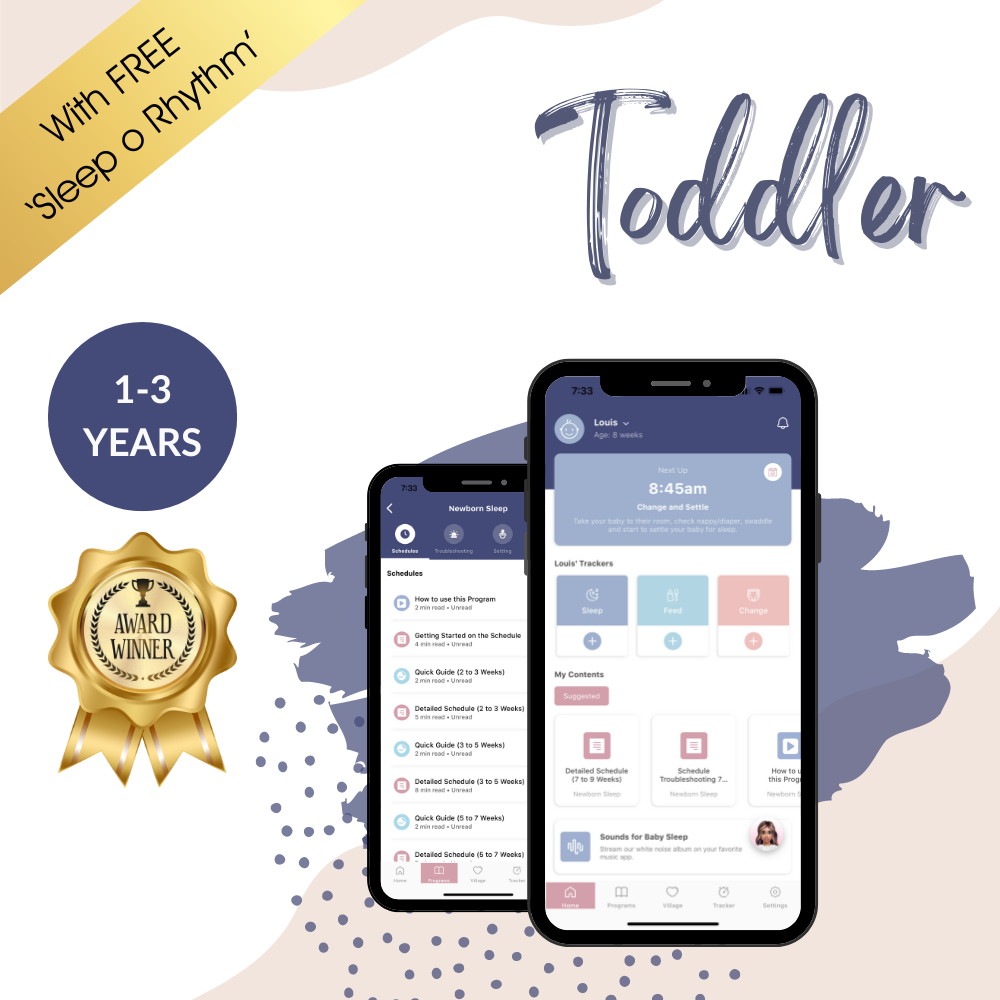
Preschooler Sleep Needs: What to Expect Ages 3 to 6 years old
By Jessica Torrisi, Certified Sleep Consultant
Reviewed by Nicky Barker (BA, Grad. Dip Tch, University of Auckland), Pediatric Sleep Science Expert
Between the ages of 3 to 6 years old, children are growing and developing at an extremely rapid rate so making sure they are getting enough sleep is more important than ever! Sleep plays an important role in a child’s physical, cognitive and social-emotional development, however, many parents are unsure exactly how much sleep their child needs at this age.
In this article, we will break down your child’s sleep needs and answer the following questions:
- How many hours of sleep does my child need?
- How do I know if my child is getting enough sleep?
- Does my preschooler still need a nap?
- What should I do if my preschooler is no longer napping during the day?
- What time should my child go to bed?
- How can I help my child to settle to sleep quicker at bedtime?
E-Book: Navigating the Preschool Years: Sleep, Behavior & Development for 3 to 6 Year Olds
There is a LOT of growth and development that happens between the ages of 3 and 6 years and your child becomes a pretty amazing, pretty independent little human. There can also, however, be a raft of challenges that accompany these changes (and I know I don't have to tell you that!).
In our comprehensive e-book we'll guide you through your little one's sleep, behaviour and development across these crucial years.
Buy Now
If you need further help with your child's sleep, make sure to check out our new e-book, Navigating the Preschool Years. In this comprehensive book, you'll find everything you need to overcome your child's sleep challenges and establish healthy sleep habits now, and into the future.
How many hours of sleep does my child need?
Most guidelines recommend that children between 3 to 5 years of age should sleep between 10 to 13 hours over a 24 hour period (which may or may not include a nap during the day). Children 6 to 12 years of age should sleep between 9 to 11/12 hours over a 24 hour period (1).
It’s worth noting though that these are broad recommendations as individual sleep patterns and needs can vary quite a bit from one child to the next. An hour more or less sleep each day may be appropriate for some children.
How do I know if my child is getting enough sleep?
Children who are not getting enough sleep will often show one or more of the following behaviours:
- Feeling tired or lethargic during the day
- Falling asleep in the afternoon/early evening
- Difficulties settling at bedtime
- Early morning waking
- Easily irritated or upset
- Difficulties with regulating emotions
- Difficulties focusing or concentrating
- A lack of motivation or interest in their usual activities
- A lack of interest in food
- Hyperactivity or impulsive behaviour
- More frequent illnesses
- For school-aged children, declining academic performance or behaviour in class (2)
If you are seeing some of these behaviours in your child, it might be an idea to try to get a bit more sleep happening - perhaps by offering a nap or bringing bedtime earlier. If your child is healthy, happy and seems well-rested though, chances are they are getting all the sleep they need.
Does my preschooler still need a nap?
As your child gets older, you will likely find that their nap becomes shorter and less frequent over time, and most children stop napping altogether between the ages of 3 and 4 years old. This can vary quite a lot from one child to the next though. My eldest child was still napping at 4.5 years old, whereas my youngest dropped their nap completely between 2.5 to 3 years.
If your preschooler is still napping during the day, this isn’t a problem unless it starts to interfere with their settling and sleep overnight. Signs that they might be ready to stop napping during the day include:
- Taking a long time to settle at bedtime or bedtime is getting pushed out later and later
- Waking multiple times overnight or having prolonged wakes overnight
- Waking very early in the morning
If your child is showing some of these signs, we would first recommend making sure that their nap starts no later than 12:30 PM, then gradually reduce the length of their nap every few days until it’s just 30-45 minutes long.
Say goodbye to sleepless nights.
Join over 800,000 families worldwide who are enjoying excellent sleep with our Sleep Programs, created by experts in the field of pediatric sleep.
Get our Sleep Programs
If they are still showing any of the signs mentioned above, then they may be ready to drop their nap altogether but we would recommend doing this gradually to give them time to adjust. Start by skipping the nap once or twice a week and increase from there. On days without the nap we also recommend bringing their bedtime earlier to help prevent over tiredness.
What should I do if my preschooler has stopped napping during the day?
It can be a sad day when your child decides they no longer need a nap but this doesn’t have to signal the end of your down time during the day. Once your child is no longer napping, we recommend replacing their nap time with “quiet time” instead. This is a period of time where your child will play quietly in their room, giving them (and you) a chance to recharge.
We recommend doing an hour or so of quiet time after lunch, around 12:30pm, and providing some relaxing activities for your child to engage in, such as:
- Reading
- Drawing
- Listening to an audio book
- Listening to music
- Building blocks
- Mindfulness/meditation
For younger children, quiet time may need to be modelled at first so you can use this time to engage in some relaxing activities of your own. As your child gets older though, you should find that they are happy to independently engage in quiet time activities in their room.
What time should my child go to bed?
This is one of those most common questions parents ask us about their children’s sleep between the ages of 3 to 6 years old and it often stems from their child having difficulties settling to sleep at their usual bedtime.
It’s easy to assume that your child is ready for a later bedtime now that they are getting older but this is rarely the case! In fact, more often than not, difficulties settling at bedtime are due to over tiredness or overstimulation at this age - so putting them to bed earlier, not later, is the key.
We recommend aiming for the following bedtimes:
| 3 years old | Bedtime 6:30-7:00 PM |
| 4 years old | Bedtime 7:00 PM |
| 5 years old | Bedtime 7:00 PM |
| 6 years old | Bedtime 7:00-7:30 PM |
Once your little one is no longer napping in the day, they will need an early night, especially if they are at daycare or school, so don’t be afraid to bring bedtime even earlier if needed - anytime between 6-7pm is fine. They may also need an earlier bedtime when they’ve had a very active day or early start.
Contrary to what many people think, an earlier bedtime doesn’t necessarily mean an earlier wake up time in the morning. In fact, a late bedtime or an overtired child are two of the main contributing factors when it comes to early rising.
How can I help my child to settle to sleep quicker at bedtime?
Knowing what time your child should be going to bed and actually getting them to go to sleep at that time are two very different things! It’s not uncommon for children this age to fluff around for ages at bedtime, asking for another drink or another story or getting out of bed over and over again. Some children can also start to get upset and want you to stay in the room with them while they go to sleep now. Whatever the issue at bedtime, we can help!
The first thing you’ll want to do is make sure you are setting your child up for success at bedtime. Here are our top tips:
- Keep the room as dark as possible and only use a nightlight if your child has expressed a fear of the dark. If you do need to use a nightlight, we recommend a red light if possible, as this has the least impact on melatonin levels.
- Use age-appropriate bedding. Until your child is able to pull up the blankets themselves, we recommend keeping them in a sleeping bag or sleep suit with legs to help prevent them getting cold during the night.
- Make sure the room is at an appropriate temperature for sleep - around 20C/68F is ideal.
- You may also want to consider the use of white noise or soft music if your child struggles to settle to sleep or if there are other sounds in the house that might wake them.
- In the 2 hours before bedtime, avoid screen time and sugar. Both screen time and processed sugar are very stimulating for young children and can inhibit their settling at bedtime and the quality of their sleep overnight. The blue light emitted from devices such as TVs, phones and tablets also disrupts the release of melatonin, making it hard for children to wind down for sleep.
- Start implementing a relaxing wind-down routine before bed. Just like adults, children need some time to wind-down and turn their brain and body off before they go to sleep. So instead of screen time or physical activities, try “quiet time” activities like the ones we mentioned earlier.
This wind-down time before bed is also a great opportunity for parents to reconnect with their children at the end of a busy day. Spending this one-on-one time with your child can help to reduce separation anxiety or repeated requests for you to come back to their room after you put them to bed.
If the sleep environment is spot on and you have a good bedtime routine in place, then the next thing to consider is whether under tiredness or over tiredness could be contributing to the difficulties you are having.
If your child is still having a nap during the day, it might be time to start gradually reducing that now or try dropping it altogether so that they will be tired enough to settle well at bedtime. Or, if your child is no longer napping during the day, they could be getting overtired, in which case bringing their bedtime earlier can help.
Okay, I've tried all that but my child STILL won't go to sleep...
Even when everything is lined up, bedtime can still be a battle! Children this age are very clever and can start to realise that they have more control over the bedtime situation now, meaning it can become a bit of a power struggle.
It’s important that you, as the parent, maintain clear boundaries and expectations around bedtime. Discuss these expectations with your child during the day so that they are prepared when bedtime comes around. It can also help give them a chance to role-play their response by playing “bedtime” with their cuddly toys.
Different families will have different expectations when it comes to bedtime. You might be happy to stay in the room while your preschooler goes to sleep or to return them to their bed a couple of times before they finally settle for the night. Or, you might want them to stay in bed and settle themselves to sleep once you leave the room.
Let's get your little one's sleep sorted ASAP!Our award-winning Sleep Programs will solve your baby's sleep challenges in no time.
Get our Sleep Programs
Decide on what your expectations are, discuss these with your child and then you can start to implement strategies to reinforce those expectations. This might include gradually removing yourself from the room, “checking in” on your child from time to time to reassure them or silently returning them each time they get out of bed.
Our comprehensive e-Book, Navigating the Preschool Years, provides further information about these settling approaches and also provides strategies for other common sleep problems encountered between 3 to 6 years of age including:
- “needing” things at bedtime
- getting out of bed
- behavioural or habit wakes overnight
- early morning waking
- nightmares and night terrors
- a fear of the dark
- room/bed aversion
- early morning waking
- night training and bedwetting
- sharing a room with a sibling
If you are experiencing any of these difficulties with your preschooler’s sleep, our e-book will help you to get things back on track and ensure that your child is getting the sleep they need for their wellbeing and development.
________
Bibliography
- NHS, American Academy of Sleep Medicine, Raising Children Network
- How Much Sleep Do Children Need? | Sleep.org. (2022, January 28). Sleep.org. https://www.sleep.org/how-sleep-works/how-much-sleep-children-need/
- Healthy Sleep Habits: How Many Hours Does Your Child Need? (2022). HealthyChildren.org. https://www.healthychildren.org/English/healthy-living/sleep/Pages/healthy-sleep-habits-how-many-hours-does-your-child-need.aspx
- How Much Sleep Do Babies and Kids Need? | Sleep Foundation. (2020, September 24). Sleep Foundation. https://www.sleepfoundation.org/children-and-sleep/how-much-sleep-do-kids-need





